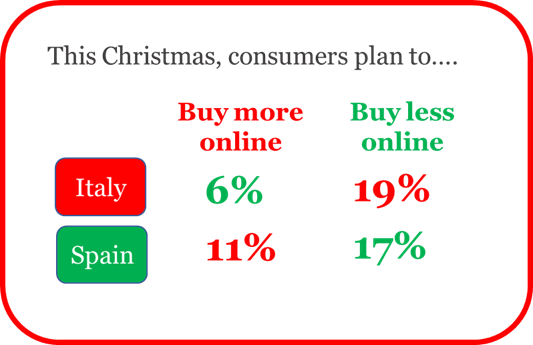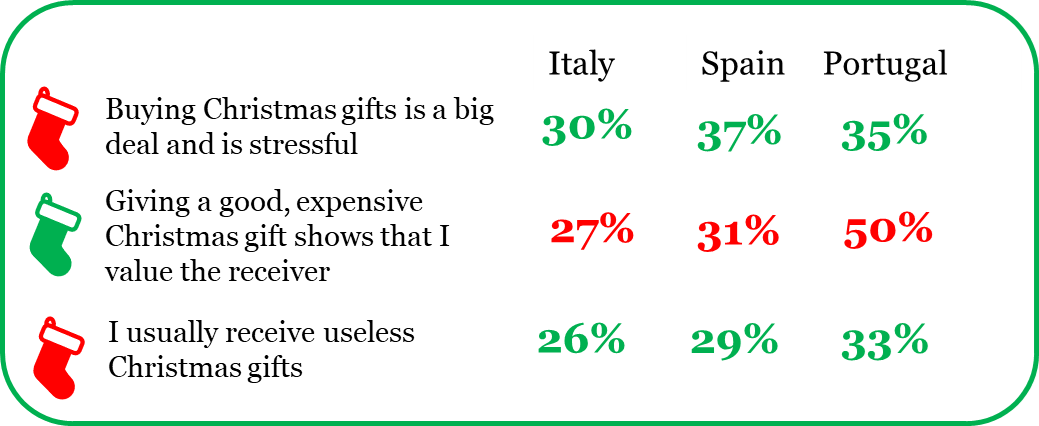This website uses cookies so that we can provide you with the best user experience possible. Cookie information is stored in your browser and performs functions such as recognising you when you return to our website and helping our team to understand which sections of the website you find most interesting and useful.
Santa’s budget is squeezed just as Christmas comes back to life

Restrictions on gatherings may be gone this Christmas, but inflation surges have pushed up prices everywhere. Euroconsumers surveyed people in Spain, Portugal and Italy to see how they feel about presents, parties and paying for it all this Christmas.
Christmas is one of the most important festivals in Europe but for the last two seasons, the pandemic has cruelly crushed the familiar family parties and pushed shopping online. With few if any restrictions left across the continent, there’s no doubt that Christmas 2022 will be very different.
But all is not peace and joy. The war casts a heavy shadow over Europe, not only in terms of the suffering of Ukrainians, but in driving up energy prices and food costs to unprecedented levels. Strikes by airline and train staff will disrupt travel plans. Covid-19 continues to hit supply chains that Europe relies on, with economic output still slow in China.
Against this festive and not-so-festive background, Euroconsumers has surveyed people in Spain, Portugal and Italy to find out what will Christmas 2022 looks like from a consumer point of view?
1. Christmas shopping comes back to the high street
Christmas retail is big business, and this year shoppers report they will be returning to bricks and mortar after relying on online stores during lockdowns and restrictions – particularly the over 55s. In Portugal, 44% of Christmas shoppers planned to do so in physical stores.
In Italy and Spain, some consumers do expect to buy even more online this year, but more people say they’ll buy less. Italians show the most enthusiasm for getting back to physical stores, with 19% of them saying they’ll buy less online and only 6% predicting they’ll buy more.

2.Christmas spending in constrained times
With skyrocketing energy prices and many people’s wages staying below double-figure inflation, it is no surprise that most consumers are cutting back this Christmas and New Year. When asked about spending over all on gifts, food, meals and parties consumers told us:

Differences in income help explain some of the differences in spending plans. Those on low incomes will have less cushion to withstand the economic shocks of the past year and so will inevitably look to cutting back on spending. Simply put, those in very comfortable positions can maintain or exceed their spending above the level of others.
3. Blowing the Christmas budget
Much more will be spent on travel, lunches, christmas markets and parties this year, but Christmas gifts remain the biggest budget line for consumers. In reality, no matter how well people try to budget for them, the amount spent is often much higher. Nearly half of consumers surveyed said they usually end up spending more money than foreseen.
In Portugal, a huge 57% of people said they regularly blew their Christmas gift budget, with 49% of Spaniards and 37% of Italians agreeing. Still, however, only around a fifth of people wait until the January sales to buy Christmas gifts and take advantage of lower prices.
4. The pleasure and the pain of gift giving
Our surveys show Christmas gift giving is a combination of pressure and pleasure. Buying gifts for family and friends is a major concern that can bring some stress. Just over a third agree that a good, high value Christmas present signifies consideration and care for the person who receives it – although this is much higher in Portugal.
On the flipside, about 1 in 3 people report receiving Christmas gifts that they think are useless – let’s hope that they don’t see this as a sign they are not valued!

With Christmas 2022 looking livelier and more sociable than for many years, we can expect to see high street shops getting a bit more of the slice of consumer spending, and of course restaurants, bars and markets attracting more people.
But the question of whether consumers will stick to their budgets in the face of frightening economic headwinds can only be answered in 2023.


